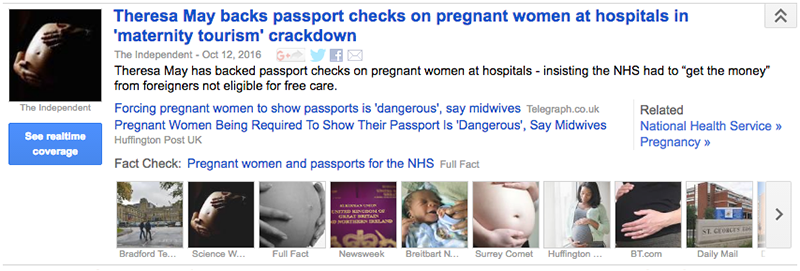During the first presidential debate last month, Hillary Clinton said she hoped “the fact checkers are turning up the volume and really working hard.” Now Google is unveiling a feature that might make their work a little easier to find.
On Thursday, the company announced that it would begin labelling fact checks in Google News. The fact check tag is appearing on the Google News website along with the Google News & Weather app on iOS and Android. It’s initially rolling out the fact check tags in the United States and United Kingdom.

In a post, Google head of news Richard Gingras explained how the company is categorizing fact checks:
While Google is introducing the fact check tag to Google News, Facebook has repeatedly had to deal with surfacing fake news stories in its Trending section since it fired its editors in August. Since then, The Washington Post’s Abby Ohlheiser and Caitlin Dewey have been running The Intersect, an excellent email newsletter which tracks trending stories on Facebook, Google, and Twitter.Google News determines whether an article might contain fact checks in part by looking for the schema.org ClaimReview markup. We also look for sites that follow the commonly accepted criteria for fact checks. Publishers who create fact checks and would like to see it appear with the “Fact check” tag should use that markup in fact check articles.
In a story published Wednesday, Dewey wrote that they’ve discovered numerous fake stories trending on Facebook in recent weeks, though they’ve admitted that their study is inherently limited since they only tracked trends during the workday and Facebook trends are individualized for each user:
As part of a larger audit of Facebook’s Trending topics, the Intersect logged every news story that trended across four accounts during the workdays from Aug. 31 to Sept. 22. During that time, we uncovered five trending stories that were indisputably fake and three that were profoundly inaccurate. On top of that, we found that news releases, blog posts from sites such as Medium and links to online stores such as iTunes regularly trended. Facebook declined to comment about Trending on the record.
It’s too soon to tell what kind of impact Google’s fact check tags will have on news consumption, but tagging different story types since 2009. Google News now features tags such as opinion and in-depth, and earlier this year it introduced a Local Source tag for stories from local news outlets.
Leave a comment